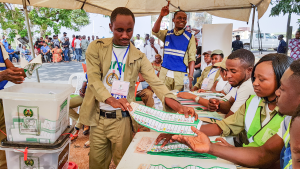
Author: Daniel Ochowechi Echoda | danielechoda29@gmail.com
Sports betting has become pervasive among Nigerian youths. Beyond the surface appeal of predicting match outcomes, other complex societal factors have also driven this issue. The aim of this article is to explore the issue of sports betting, shed light on why Nigerian youths are increasingly drawn to it, and suggest solutions to the rise of gambling in the Nigerian society
AN OVERVIEW OF SPORTS BETTING
The establishment of the Premier Lotto in 2001 marked the inception of the sports lottery in Nigeria. The sports betting industry has continued to rise since then, as the lotto business was followed by companies such as Winners Golden Bet, NairaBET, and Bet9ja. The factors that have sustained this growth include widespread accessibility of smartphone and internet, appeal of predicting sports outcomes and, especially, Nigerians’ passion for football. The industry’s expansion is evident in the millions of Nigerians who actively participate in various forms of online betting in the country.
Sports betting brings about both positive and negative outcomes, encompassing various aspects of individuals’ lives and the society. Negatively, it can lead to financial losses, mental health issues, and, in extreme cases, tragic consequences such as suicide, as seen in the case of a man who shortly before taking his life, for losing a bet, wrote that the lack of job was what made him a gambler. Also, sports betting can exploit the vulnerable, particularly the poor who bet for survival, and that can end in violence and a decline in ambition, creativity, and innovation among such people.
On the other hand, despite the risks associated with sports betting, it is a huge source of income for many and contributes to the growth of the sports industry in the country. Moreover, many Nigerians who take up various job positions in betting shops and companies become gainfully employed. These job opportunities provide income and employment for Nigerians and help to curb crime by offering an alternative to illicit activities for many, contributing to the growth of the economy.
WHY SPORTS BETTING IS POPULAR AMONG NIGERIAN YOUTHS
Aside from enabling factors like the widespread availability of smartphones and the internet, or general factors like the perceived ease of making money, peer pressure, addiction, etc., the social factors of economic inequality, poverty and unemployment appear to be salient drivers of sports betting amongst Nigerian youths.
In Nigeria, there is a growing economic inequality, as a minority amasses significant riches. With a wealth inequality score of 35.1, the country ranks 11th in West Africa and 100th globally. Also, the Gini coefficient, projected at 0.35 for 2028, highlights the issue of persistent wealth gap in the country. This contrast in economic power fuels youth involvement in betting, as the youth seek to utilize every means possible to bridge the gap in the exacerbating disparities in access to opportunities. The allure of rapid upward mobility, amplified by potential windfalls from successful bets, intensifies amidst divergent lifestyles and prospects.
Similarly, poverty is pervasive in the Nigerian society, with over 40% of the population living below the national poverty line. Consequently, seeing that betting offers a perceived shortcut to financial abundance, many youths are drawn to the act. To them, sports betting provides relief, from financial stress, and serves as a coping mechanism in their predicament. Besides, lack of financial literacy, which is common among such people, also amplifies participation, as they may be unaware of the associated risks of sports betting.
What is more, the high unemployment rate in Nigeria also contributes to sports betting among Nigerian youths. According to the National Bureau of Statistics (NBS), the unemployment rate in Nigeria is 4.1% in the first quarter of 2023, down from 5.3% in the fourth quarter of 2022. This continual rise in the scarcity of job opportunities, particularly among the younger population, fosters a sense of frustration and economic stagnation. In the absence of employment, betting presents itself as an avenue for financial relief.
SOLUTIONS
From the aforementioned, it follows that one way to curb the prevalence of sports betting among Nigerian youths is by addressing economic inequality in the country. The Nigerian government must work towards securing equal access to opportunities for Nigerians, and targeted efforts must be made to bridge the wealth disparity in the country. This can take the form of implementing inclusive economic policies, promoting education and skill development in marginalized communities, and fostering job creation initiatives to address the root causes that make youths perceive betting as a shortcut to financial success.
Additionally, to curb the pervasive nature of sports betting, it is essential to address the poverty that fuels the desperation for gambling. This can be achieved through poverty alleviation programs, improved access to education, and initiatives that enhance financial literacy among Nigerians, particularly the youth. These efforts will provide alternative paths to financial stability and foster resilience against the temporary relief that betting provides.
Finally, both the Nigerian government and private sectors must collaborate on initiatives that promote job creation, skill development, and entrepreneurship in the country, specifically catering to its young and growing population. When youths are equipped with marketable skills by nurturing their entrepreneurial spirit, they become not only economically empowered but also instilled with hope and purpose, providing them with a far more sustainable alternative to the momentary highs of betting.
CONCLUSION
In conclusion, sports betting has gained popularity among Nigerian youths, driven in part by the fascination of predicting sports outcomes. While the activity has both positive and negative aspects, its roots can be traced to underlying societal issues such as economic inequality, poverty, and unemployment. Addressing these challenges through inclusive policies, poverty alleviation, and job creation efforts is crucial for redirecting youths toward more sustainable paths, steering them away from the temporary thrills of betting. It’s important to note that these proposed solutions are not exhaustive, and there may be additional reasons why youths engage in sports betting. Nonetheless, these salient areas cannot be overlooked.


